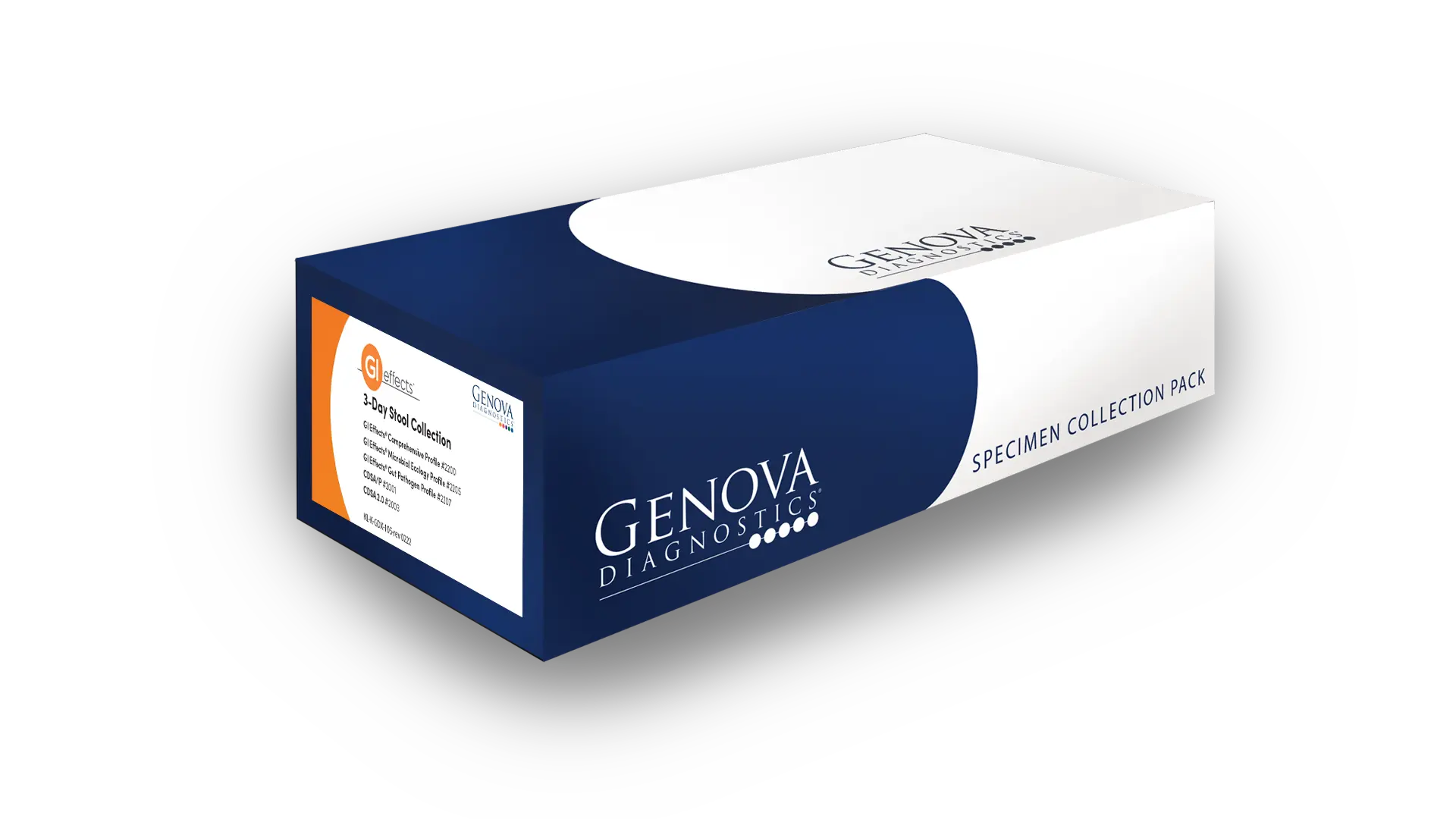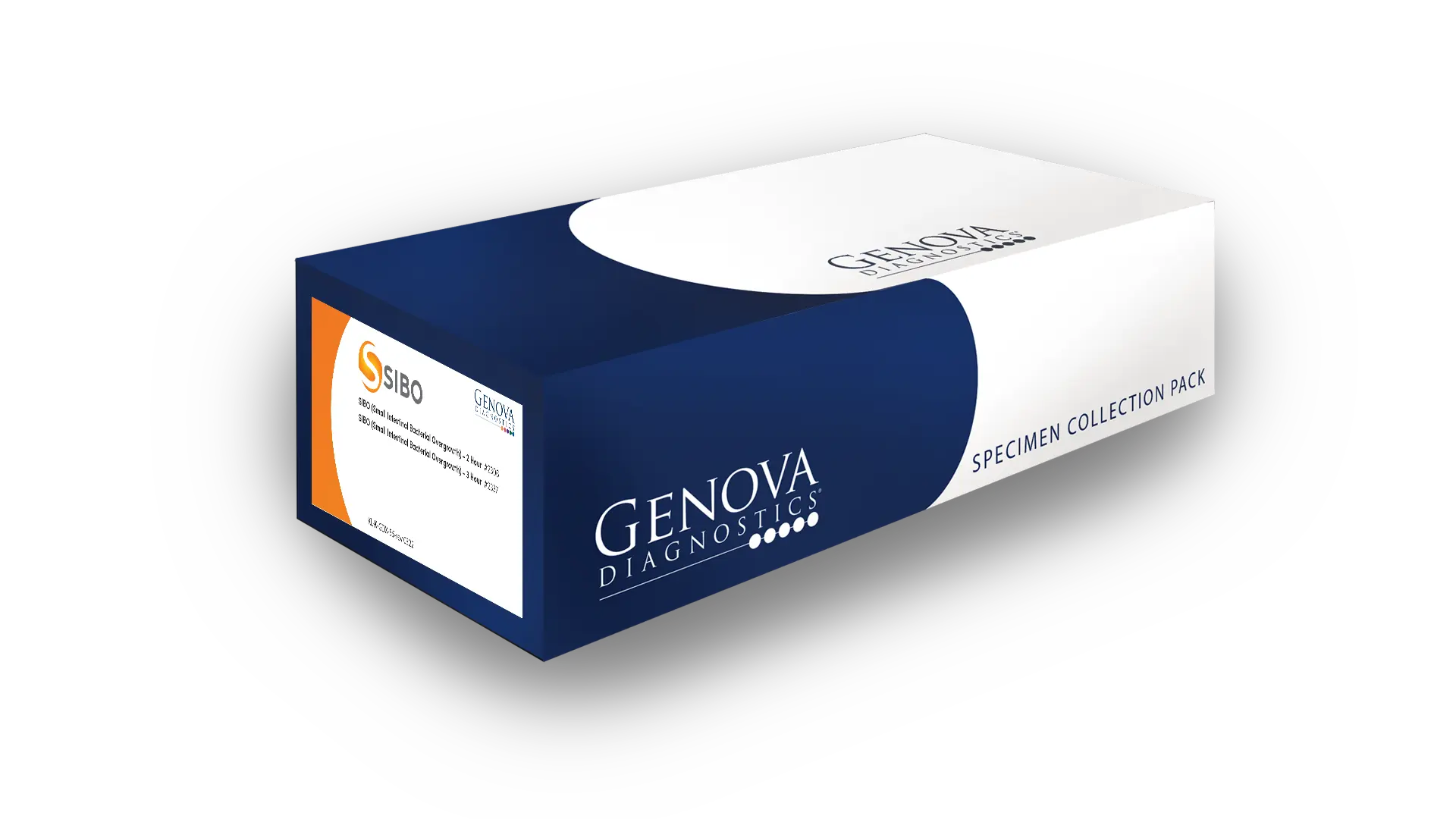We use cookies to enhance your browsing experience and analyze the performance of our website. By clicking Continue, you agree to the use of cookies. For more information, please see our Privacy Policy or update your Cookie Preferences.

Uncover the root cause of IBS, IBD, acid reflux, abdominal pain, and other digestive conditions
with our comprehensive gut health testing.

| Biomarkers Reported |  Comprehensive #2200* Comprehensive #2200* |
 Microbial Ecology #2205* Microbial Ecology #2205* |
 Gut Pathogen #2207* Gut Pathogen #2207* |
 Fundamentals #2209 Fundamentals #2209 |
|
|---|---|---|---|---|---|
| Pancreatic Elastase 1 | |||||
| Putrefactive SCFA/ Products of Protein Breakdown (Total) (Valerate/Isobutyrate/Isovalerate) | |||||
| Fecal Fat (Total) | |||||
| Long Chain Fatty Acids | |||||
| Triglycerides | |||||
| Phospholipids | |||||
| Cholesterol | |||||
| Calprotectin | |||||
| Eosinophil Protein X (EPX) | |||||
| Fecal sIgA | |||||
| SCFA (Total) (Acetate, n-Butyrate, Propionate) | |||||
| n-Butyrate Concentration | |||||
| SCFA Distribution | |||||
| n-Butyrate % | |||||
| Acetate % | |||||
| Propionate % | |||||
| Beta-glucuronidase* | |||||
| Fecal Lactoferrin (#2311) | |||||
| Commensal Bacteria (PCR)* | |||||
| Bacteroidetes Phylum | |||||
| Bacteroides-Prevotella group | |||||
| Bacteroides vulgatus | |||||
| Barnesiella spp. | |||||
| Odoribacter spp. | |||||
| Prevotella spp. | |||||
| Firmicutes Phylum | |||||
| Anaerotruncus colihominis | |||||
| Butyrivibrio crossotus | |||||
| Clostridium spp. | |||||
| Coprococcus eutactus | |||||
| Faecalibacterium prausnitzii | |||||
| Lactobacillus spp. | |||||
| Pseudoflavonifractor spp. | |||||
| Roseburia spp. | |||||
| Ruminococcus spp. | |||||
| Veillonella spp. | |||||
| Actinobacteria Phylum | |||||
| Bifidobacterium spp. | |||||
| Bifidobacterium longum | |||||
| Collinsella aerofaciens | |||||
| Proteobacteria Phylum | |||||
| Desulfovibrio piger | |||||
| Escherichia coli | |||||
| Oxalobacter formigenes | |||||
| Euryarchaeota Phylum | |||||
| Methanobrevibacter smithii | |||||
| Fusobacteria Phylum | |||||
| Fusobacterium spp. | |||||
| Verrucomicrobia Phylum | |||||
| Akkermansia muciniphila | |||||
| Firmicutes/Bacteroidetes (F/B Ratio) | |||||
| Lactobacillus spp. | |||||
| Escherichia coli | |||||
| Bifidobacterium spp. | |||||
| Additional Bacteria: Citrobacter sp., Klebsiella pneumoniae, Proteus mirabilis, Salmonella sp., Enterococcus sp., etc. | |||||
| Mycology (Yeast/Fungi): Candida albicans, Candida krusei, Candida parapsilosis, Rhodotorula sp., Saccharomyces, etc. | |||||
| Bacterial Sensitivties (pharmaceutical & botanical) | |||||
| Mycology Sensitivities (pharmaceutical & botanical) | |||||
| Microscopic Exam Results (a comprehensive evaluation for ova and parasites) | |||||
| Nematodes - roundworms | |||||
| Acylostoma duodenale (Hookworm) | |||||
| Ascaris lumbricoides | |||||
| Capillaria philippinensis | |||||
| Enterobius vermicularis | |||||
| Necator americanus (Hookworm) | |||||
| Strongyloides stercoralis | |||||
| Trichuris trichiura | |||||
| Cestodes - tapeworms | |||||
| Diphyllobothrium latum | |||||
| Dipylidium caninum | |||||
| Hymenolepis diminuta | |||||
| Hymenolepis nana | |||||
| Taenia spp. | |||||
| Trematodes - flukes | |||||
| Clonorchis/Opisthorchis spp. | |||||
| Fasciola spp./Fasciolopsis buski ova | |||||
| Heterophyes/Metagonimus ova | |||||
| Paragonimus spp. | |||||
| Schistosoma spp. | |||||
| Protozoa | |||||
| Balantidium coli | |||||
| Blastocystis spp. | |||||
| Chilomastix mesnili | |||||
| Cryptosporidium spp. | |||||
| Cyclospora cayetanensis | |||||
| Dientamoeba fragilis | |||||
| Entamoeba coli | |||||
| Entamoeba dispar | |||||
| Entamoeba hartmanni | |||||
| Entamoeba histolytica | |||||
| Entamoeba polecki | |||||
| Endolimax nana | |||||
| Giardia | |||||
| Iodamoeba butschlii | |||||
| Isospora spp. | |||||
| Trichomonads (e.g. Pentatrichomonas) | |||||
| Blastocystis spp. | |||||
| Cryptosporidium spp. | |||||
| Cyclospora cayetanensis | |||||
| Dientamoeba fragilis | |||||
| Entamoeba histolytica | |||||
| Giardia | |||||
| Fecal Occult Blood | |||||
| Color | |||||
| Consistency | |||||
| Campylobacter | |||||
| Clostridium difficile EIA | |||||
| Helicobacter pylori Stool Antigen EIA* | |||||
| KOH Preparation for Yeast | |||||
| Macrospcopic/Direct Examination for Parasites | |||||
| Shiga-like Toxin Escherichia coli EIA | |||||
| Zonulin Family Peptide, Stool* | |||||
| * Biomarkers with product numbers are available as stand-alone tests. | |||||
| Included Biomarker Available as Add-on | |||||

The GI Effects Comprehensive Stool Profile is a group of advanced stool tests that provide actionable clinical information for the management of gastrointestinal health. This profile offers insight into digestive function, intestinal inflammation, and the intestinal microbiome.

The Small Intestinal Bacteria Overgrowth (SIBO) profiles are non-invasive breath tests which capture exhaled hydrogen (H2) and methane (CH4) gases following patient ingestion of a lactulose solution to evaluate bacterial overgrowth of the small intestine.
Healthcare providers can access our full test menu when ordering through their myGDX account.
GI Effects Comprehensive Profile #2200 | Sample Report | 1-day Instructions | 3-day Instructions
GI Effects Fundamentals #2209 | Sample Report | 1-day Instructions | 3-day Instructions
GI Effects Gut Pathogen Profile #2207 | Sample Report | 1-day Instructions | 3-day Instructions
GI Effects Microbial Ecology Profile #2205 | Sample Report | 1-day Instructions | 3-day Instructions
SIBO - 2 Hour #2306 | Sample Report | Instructions
SIBO - 3 Hour #2337 | Sample Report | Instructions